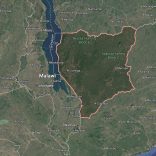Mozambique launches first forensic DNA laboratory - Watch
Delays will increase cost of Maputo-Catembe bridge

Notícias
The delays in completing the suspension bridge over the Bay of Maputo, linking the centre of the city to the outlying urban district of Katembe, will increase the cost of the bridge and its associated roads, the chairperson of Maputo-Sul, the state company responsible for the bridge, Silva Magaia, said on Tuesday.
Speaking at a hearing in Maputo, called by the parliamentary commission on agriculture, economic and environmental matters, Magaia pointed out that costs will increase because the work yards will need to remain open longer than initially forecasts, equipment must be maintained for longer, and there will be additional bills for water, electricity and security.
“Certainly the contractor (the China Road and Bridges Corporation. CRBC) will present a complaint about the delays”, warned Magaia.
The main problem is that several hundred stallholders in the Nwankakana informal market are blocking the northern access to the bridge, and are refusing to leave unless they are paid huge sums in compensation. They are effectively squatting on land owned by the Maputo municipality, yet the Municipal Council has allowed the impasse to continue, rather than simply sending in bulldozers to knock down the stalls.
The Council points out that the stallholders have no right to compensation. Furthermore, it has offered them space to sell their wares in a new, properly structured municipal market, but they are still refusing to move.
Magaia noted that the intransigence of the stallholders had held up construction of the viaduct and ramp to the northern end of the bridge by about five months.
The initial forecast was that the bridge would open to traffic in December. That is now out of the question. Magaia said there is not yet any new deadline for completing the job, “but we know we shall be working in the early months of 2018”.
The Nwankakana stallholders are demanding compensation for their flimsy stalls of between 195,000 and 300,000 meticais (between 3,200 and 4,120 US dollars), depending on the size of the stalls. Neither Maputo-Sul nor the Municipal Council has the money available for this compensation.
“Our position is one of sadness”, said Magaia, “because finishing the job is urgent”. He accused the stallholders of imposing “unilateral demands”, which could not lead to any way out from the impasse. The latest demands for compensation, he said, demolished all the consensual positions that had been reached in previous negotiations.
Yet the parliamentary commission merely urged Maputo-Sul to continue “dialogue” with the stallholders, in order to reach “a fair solution”. The chairperson of the commission, Francisco Mucanheia, a deputy from the ruling Frelimo Party, claimed it was necessary to strike “a balance” between Maputo-Sul and the stallholders.
He also called for awakening “patriotic consciousness, since concluding the bridge will contribute to the economic development of the country, and confer international prestige on Mozambique”.
The initial cost of the project was 787 million US dollars, including the suspension bridge and its access roads, the 187 kilometre road from Katembe to Ponta d’Ouro on the border with the South African province of Kwazulu-Natal, and the 63 kilometre road between the towns of Boane and Bela-Vista.












Leave a Reply
Be the First to Comment!
You must be logged in to post a comment.
You must be logged in to post a comment.